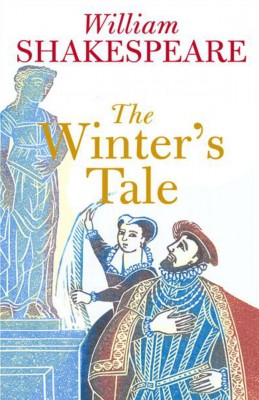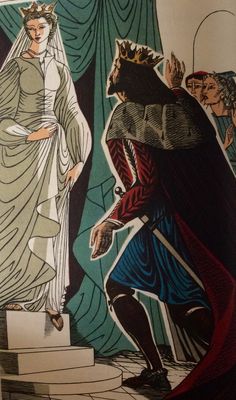2
Feb
‘The Winter’s Tale’ by William Shakespeare – Dark Tragedy or Light Comedy or Romance?
Posted February 2, 2017 by Anokatony in Book Reviews. Tagged: William Shakespeare. 4 Comments
‘The Winter’s Tale’ by William Shakespeare (1610) – 108 pages

“Merry or sad shall it be? As merry as you will. A sad tale’s best for winter.”
‘The Winter’s Tale’ is really two plays that fit together uncomfortably. The first three acts are a dark tragedy involving a Sicilian King’s insane jealousy resulting in the deaths of his son and wife and banishment of his baby daughter. The last two acts take place sixteen years later, and we are supposed to believe that the King has redeemed himself for those deaths through penitence to the point where his wife the Queen magically comes back to life. This is one of the most hokey preposterous scenes in all of Shakespeare.
King Leontes of Sicily is having such a good time with his visiting old friend King Polixenes of Bohemia that he asks his wife Queen Hermione to convince his friend to stay. Hermione does as her husband asks, but Leontes gets suspicious when he sees Hermione and Polixenes together that they are fooling around behind his back. Hermione is pregnant, and Leontes immediately suspects that Polixenes is the father of the baby. Soon Leontes becomes deranged with jealousy, and attempts to have one of his servants kill Polixenes, but instead the servant helps Polixenes escape back to Bohemia. Leontes puts his wife in prison where she has the baby girl Perdita. Leontes banishes the baby, and another servant takes the baby to Bohemia whereupon the servant is immediately eaten up by a bear. A shepherd discovers the baby and takes her home. Soon the king’s young son dies for missing his mother. When Hermione hears the news, she collapses and soon she dies also. Only then is Leontes filled with remorse.
So far, ‘The Winter’s Tale’ is a dark tragedy, but act four begins in a much lighter mood sixteen years later in Bohemia. The baby Perdita is now a beautiful young woman, and by some strange coincidence King Polixenes’ son Florizel has become enamored by her even though she is a lowly shepherd’s daughter. Most of Act IV is taken up with the spring sheep-shearing festival where there is much singing and dancing. A joke figure named Autolycus comes to the festival, and he plays a similar hearty comedic role as Falstaff in Shakespeare’s historical plays. At this point we are far, far away from the earlier tragedy.
 A lot of plot ensues but by Act V we are back in Sicily. The King Leontes has been pining away with regret for sixteen years, but now his banished daughter is back with her royal boyfriend from Bohemia, and both Kings watch as the couple gets married. After the wedding they all go to see the statue of Queen Hermione that her best friend Paulina has made, and, wonder of wonders, it comes alive, and Leontes and Hermione are reunited.
A lot of plot ensues but by Act V we are back in Sicily. The King Leontes has been pining away with regret for sixteen years, but now his banished daughter is back with her royal boyfriend from Bohemia, and both Kings watch as the couple gets married. After the wedding they all go to see the statue of Queen Hermione that her best friend Paulina has made, and, wonder of wonders, it comes alive, and Leontes and Hermione are reunited.
I suppose there are two ways to look at ‘The Winter’s Tale’. One way is that the tale is out-and-out preposterous. The other is to view it as a case study in the magnificent power of redemption for King Leontes. However I suspect that most modern audiences would find that King Leontes’ previous crimes were too heinous for him to be redeemed.
Grade: B+
 A lot of plot ensues but by Act V we are back in Sicily. The King Leontes has been pining away with regret for sixteen years, but now his banished daughter is back with her royal boyfriend from Bohemia, and both Kings watch as the couple gets married. After the wedding they all go to see the statue of Queen Hermione that her best friend Paulina has made, and, wonder of wonders, it comes alive, and Leontes and Hermione are reunited.
A lot of plot ensues but by Act V we are back in Sicily. The King Leontes has been pining away with regret for sixteen years, but now his banished daughter is back with her royal boyfriend from Bohemia, and both Kings watch as the couple gets married. After the wedding they all go to see the statue of Queen Hermione that her best friend Paulina has made, and, wonder of wonders, it comes alive, and Leontes and Hermione are reunited.
Posted by Lisa Hill on February 2, 2017 at 7:54 AM
Brave man, rating Shakespeare with only B+!
I’ve never read this play so I’ll take your word for it:)
LikeLiked by 1 person
Posted by Anokatony on February 2, 2017 at 7:57 AM
Hi Lisa,
‘The Winter’s Tale’ is second rank Shakespeare compared to Hamlet, Macbeth, the historical plays, Much Ado About Nothing, etc. Wait until I get to third rank Shakespeare! 🙂
LikeLike
Posted by Christopher Newmarker on February 2, 2017 at 9:08 AM
Thanks, Tony! I’ve never read or seen “The Winter’s Tale,” and now I know I didn’t miss anything. 🙂
LikeLike
Posted by Anokatony on February 2, 2017 at 9:54 PM
Hi Chris,
Besides reading the play, I watched an old BBC television version of the play which was not very good. There is at least one good characterization in ‘The Winter’s Tale’, that of Hermione’s friend Paulina, but other than that I did not find much to recommend the play which is an uneasy mix of tragedy and comedy.
LikeLike